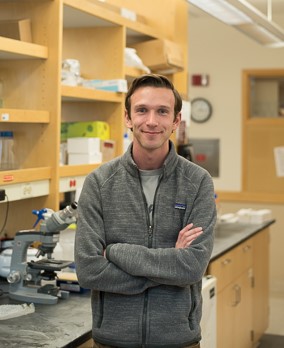GMS PhD Spotlight: Riley Pihl (MTM ’25)
 Riley Pihl is a PhD candidate in the lab of Assistant Professor of Medicine Katrina Traber, MD, PhD. Riley matriculated into the Program in Biomedical Sciences (PiBS) in 2020 before transitioning into the Molecular and Translational Medicine program. His research in the Traber Lab focused on neutrophil regulation during acute bacterial pneumonia. Riley defended his dissertation in March 2025 and will graduate in May. Learn more about Riley below!
Riley Pihl is a PhD candidate in the lab of Assistant Professor of Medicine Katrina Traber, MD, PhD. Riley matriculated into the Program in Biomedical Sciences (PiBS) in 2020 before transitioning into the Molecular and Translational Medicine program. His research in the Traber Lab focused on neutrophil regulation during acute bacterial pneumonia. Riley defended his dissertation in March 2025 and will graduate in May. Learn more about Riley below!
What did you complete your dissertation research on? How did you settle on that topic?
My dissertation focused on neutrophil regulation during acute bacterial pneumonia. I joined a lab with a new PI (Katrina Traber). She had just completed some single cell RNA-sequencing experiments on neutrophils from S. pneumoniae infected mice and found thousands of differentially expressed genes between neutrophils from infected blood and infected lung. Neutrophils have typically been thought of as ‘bags of bleach’ that show up to cites of infection to kill bacteria, so exploring neutrophil heterogeneity, and then how they’re regulated was a new and exciting direction.
Why did you choose to do a PhD?
I wanted to be a scientist that could lead projects. Typically, companies require a PhD for scientists with some autonomy and direct reports, so a PhD is typically a prerequisite.
How would you describe a typical day as a PhD student?
There’s a lot of day-to-day variation. Sometimes, there are six hours of meetings/seminars, sometimes it’s a 10–12-hour wet lab/benchwork day and sometimes it’s a writing from home day.
What is one of your best memories from the time in your PhD?
Small conferences (Gordon Research Conference: Biology of Acute Respiratory Infections) with pneumonia biology group were always an amazing experience. It’s a small 100-to-200-person conference. It’s five to six days with cutting edge science from 9 a.m. to lunch, free time from noon to 4 p.m. and some more talks from 7 to 9 p.m. Everyone hangs out after and during the day. There are a lot of games and activities. We’ve done beach volleyball, axe throwing, mechanical bull riding, among other things. 11/10 – I highly recommend small conferences with fun lab groups.
Did you face any unexpected challenges during your time in your program? How did you overcome them?
Getting some in vitro assays that nobody in my group has done to work was challenging. Neutrophil bacterial killing assays are very tricky, so I had to cold-email groups at other universities that have done them to get a protocol and then had to troubleshoot a lot of variables on my own.
What are your next steps?
To claim the Darksaber and rule Mandalore. I’m also applying/interviewing for industry jobs and postdoc positions.
Do you have any advice for future PhD students, or anything else you’d like to share?
I think people do a PhD for all sorts of reasons but some general advice (and pitfalls to avoid) would be to:
- Join a lab based on how well you get along with the PI and the other people in the lab. There are always a few people that pick a lab based primarily on the specific project they want or how ‘prestigious’ the lab is, and those folks tend to have the rougher PhD experiences. You likely won’t get to work on the specific project that you want all the time post-grad anyways, so enjoying working in the general subject area that you’re interested in (or hadn’t thought about before) with people that like is going to serve you best.
- Make sure to stay mission focused during your PhD (remember, your goal is to graduate!). You don’t need to learn every technique, pad your resume with every possible thing you can, etc., so make sure that you’re spending the bulk of your time and effort on things that help you get the job/next step that you want. To be clear, you can and should help your other grad students with projects, and do side projects or grants for your PI when it makes sense, but make sure that most of your time during any given week is working toward your goals.
What do you like to do for fun in Boston?
Running, soccer, bar trivia, reality tv and anything my labmates think looks fun.